May 3, 2016 Update Medical communities and studies on metabolic measures should skew headlines into bold “I told you so” moments given that many have wagged about this show doing ‘more harm than good’ for years, yet producers bring it back time and again, knowing profit over public health reigns supreme.
“I’m surprised someone hasn’t died yet” should have been at least a mini-clue, but now as various doctors and renowned critics weigh in on the ongoing health fallout and permanent metabolic damage, it makes me wonder if media mop ups for this gonzo ‘reality show’ have finally reached critical mass enough to shut it down.
Feb. 26, 2014 “Welcome to your different eating disorder. It’s much like your old one only people think you look better.” –Kai Hubbard, 3rd season contestant, The Biggest Loser
That jarringly candid quote should be a massive shoulder shake to media producers of shows like The Biggest Loser who are cashing in on our national obsession with ‘Before/After’ makeover methodologies…and at the very least, worthy analysis for health literacy during this National Eating Disorders Awareness Week.
We’ve talked a lot about the role of media in perpetuating body fixations and how to counteract harmful “thinspiration” messages, kids’ spindly toy distortions and beauty ideals by deconstructing with media literacy but we haven’t yet focused on media’s role purporting to “help health” by ratcheting up the ratings game in ‘reality TV’ meets body image bootcamp dynamic.
Even with all the medical ‘intent,’ losing big chunks of weight with magical ‘before/after’ transformative life fixes hits a strong chord with disordered eating experts on body image like Marci Warhaft-Nadler who repeatedly reminds, “Self-worth should never be measured in pounds.”
 Since Marci comes from a ‘been there, done that’ experiential realm of disordered eating, her recent critique of The Biggest Loser finale packed an extra powerful, poignant punch:
Since Marci comes from a ‘been there, done that’ experiential realm of disordered eating, her recent critique of The Biggest Loser finale packed an extra powerful, poignant punch:
“Weight loss for the entertainment of a viewing audience is ridiculous. And weight loss for the entertainment of a viewing audience under the guise of helping people lead healthier lifestyles is sinister…They weren’t interested in the contestant who had become the healthiest, just the one who had gotten the skinniest.”
The “lose it for health” narrative is especially watch worthy in commercial media.
When ABC Family piloted the TV show “Huge” awhile back, I wrote about the opportunity to educate and potentially also obliterate, by fouling up the works further with dire disordered consequences if they got their messaging wrong. Thankfully, the producers were diligent about providing talking points and experts and health educators to field important conversations swirling around, but it begs some powerful public health questions…
What IS media’s responsibility in refraining from playing a pivotal or at the very least contributory role in eating disorders with shows like The Biggest Loser?
Is there EVER a role for ‘competitions’ like this on or off the air and how can ‘reality TV’ be less reckless and feckless about behavioral health cues and sidewinders landing on kids particularly?
What role does coaching play in dramatic weight loss and how do media shows like this help or hinder the real life performance of human beings in shifting lifestyles to healthier directions?
Should there be regulatory measures in place to mitigate damage and ensure public health is not a profiteering ratings game?
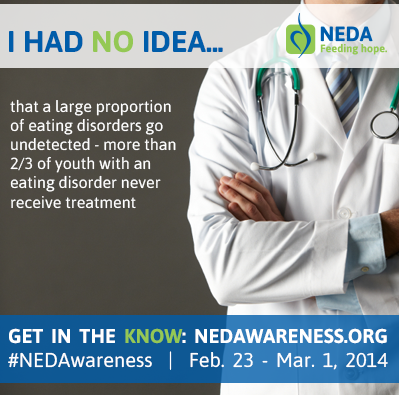 As Time magazine notes this week in Young Kids, Old Bodies “Runaway obesity is turning a generation of children into biological adults, aging them before their time” the impact of obesity placing children ‘at risk’ is a very worthy public health goal.
As Time magazine notes this week in Young Kids, Old Bodies “Runaway obesity is turning a generation of children into biological adults, aging them before their time” the impact of obesity placing children ‘at risk’ is a very worthy public health goal.
That said, it’s noteworthy to add there is no mention of the new JAMA research showing an applaudable 40% decline in obesity over the last eight years in the young age group of 2-5…so the lens of critical thinking on word choice, visuals and what gets left OUT of the stats as well as what gets put in is imperative. (see figure at left on undetected eating disorders, and be particularly mindful of outrage baiting phrases like “epidemic” on all statistics served in ANY realm, kids’ health or otherwise!)
I posed some of the tactical, hands-on questions about “weight loss as mass media entertainment” to a cross-section of fitness coaches, including Marci Warhaft-Nadler, author of The Body Image Survival Guide for Parents, play advocate Dr. Kwame Brown of Move Theory and the FUNction community and Lee Jordan of Fullest Living.com who was once 450 pounds himself and is now a certified health coach and trainer for those needing to lose 100 pounds or more for medical mandates. Here’s what they had to say:
Amy Jussel, Shaping Youth: Given the dangers of using weight loss as ‘entertainment’ in The Biggest Loser from a health and disordered eating standpoint, do you feel ‘reality TV’ style entertainment shows like this should be banned or altered? Why/why not? How can we best explain the reasoning to ditch the pop culture “before + after fast fix” lens for a healthier slow and steady “less appearance more fitness” directive when shows set up exactly the opposite?
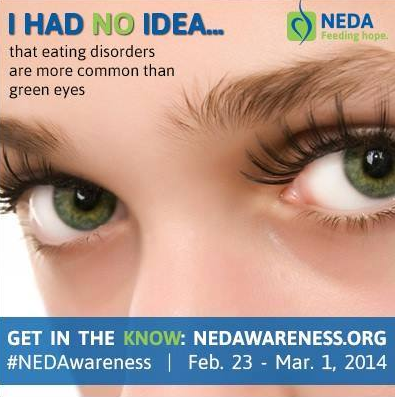 Marci Warhaft-Nadler, Fit vs Fiction: “It’s important to point out to our kids that what they see on TV is ENTERTAINMENT.
Marci Warhaft-Nadler, Fit vs Fiction: “It’s important to point out to our kids that what they see on TV is ENTERTAINMENT.
The goal of the networks is to make money and the only way they can do that is by making their viewers believe that they need to buy what they’re selling. In the case of The Biggest Loser, they’ve managed to disguise a 60 minutes infomercial as an inspirational health and fitness show.
They claim to promote healthy living when all they’re really promoting are the diet books and weight loss products being hawked by their celebrity trainers. The dangerous thing about this show is that it pretends to be about getting healthy when it’s really just about getting skinny, at all costs.
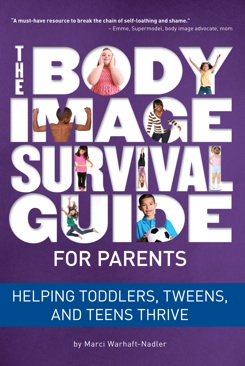 In my book, I interviewed Season 3 runner-up, Kai Hibbard about her experience on the show and she explained that even though it’s been several years since she’s been on The Biggest Loser, she’s still traumatized from the ordeal.
In my book, I interviewed Season 3 runner-up, Kai Hibbard about her experience on the show and she explained that even though it’s been several years since she’s been on The Biggest Loser, she’s still traumatized from the ordeal.
There was very little concern for her health or well-being during her time on the show and their extreme diet and exercise regimen left her physically, emotionally and psychologically damaged. Our society is under the impression that skinny is always synonymous with healthy and that’s just not the case.
Too many kids are willing to put their health at risk to attain the “perfect” bodies they see on TV without realizing that what you see is very rarely what you get. According to Kai, one contestant was actually urinating blood at the finale due to the drastic measures he took to “look” fit, and Kai herself experienced hair loss and the loss of her menstrual cycle while on the show. The show can claim to want to inspire people to get healthy, but viewership and higher ratings mean higher pay checks…”
 Dr. Kwame Brown, Move Theory: “I don’t think reality TV should be banned. I think it should be ridiculed until people are ashamed to make it…because it is a million light years away from “reality” anything.
Dr. Kwame Brown, Move Theory: “I don’t think reality TV should be banned. I think it should be ridiculed until people are ashamed to make it…because it is a million light years away from “reality” anything.
As for deconstructing the messages to kids: 16 words. Some of them are prepositions: It. is. a. fantasy. world. that. people. make. up. to. get. money. by. manipulating. you.
As far as short term fixes vs long term change, the difference, to me, is night and day: You can choose joy, connection, and community over fear and guilt. One will create steady changes in your life that last. The other will jerk you around on a yo-yo and give you metabolic and emotional whiplash. Riddle: Which scenario do you think fad dieting gives you?
(Regarding false benchmarks of media applauding, promoting, and rewarding massive weight drops he said:)
“I don’t discuss weight with kids. I play with them. I advocate helping them learn where food comes from, how to grow it, how to make it. I advocate helping them learn to create their own movement journey. It is in NOT having the conversation where I think we have our biggest impact on MOST kids. Also, I think we need LOTS and LOTS of celebrity examples of people that make sense. Change the conversation from one about “what exactly is a healthy weight” (impossible to answer) to “hey, let’s go outside and play these games and plant this garden.”
Amy Jussel, Shaping Youth: What role does coaching play in body-shaming and eating disorders with the harder-faster-stronger reality show style push? What works, and what doesn’t in healthy fitness training vs pitting competitors against one another?
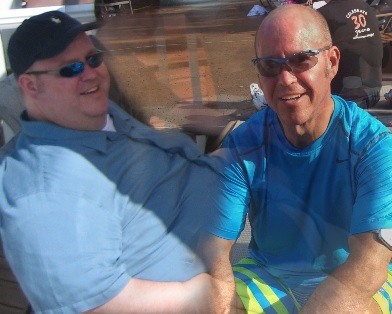 Lee Jordan, Fullest Living: “It’s well known that the real path to health and fitness is in fact the slow & steady, “life style” approach which knocks “appearance” off its false throne and places it in its rightful position as an ancillary “nice to have” benefit.
Lee Jordan, Fullest Living: “It’s well known that the real path to health and fitness is in fact the slow & steady, “life style” approach which knocks “appearance” off its false throne and places it in its rightful position as an ancillary “nice to have” benefit.
The whole “lead a horse to water” notion sets up little if any success, and sometimes well-meaning medical professionals in an effort to force the horse to drink will use threatening, negative, “shaming” tactics – which we now know not only doesn’t help the obese person or child, it sends them farther into their disease with stigma. Essentially, in an attempt to get the “horse” to drink they hold its head underwater nearly drowning it.
I suggest the best course of action when we are working/coaching people is to become the salt, therefore creating thirst for slow and steady, lifestyle change; it can only work when the person is willing to drink on their own, another reason “environmental fixes” don’t work. How then do we create thirst as coaches?
Rather than attempt to try to change human nature – seeking the “shortest distance” between two points, we use a series of questions and discussions, of which motivational interviewing is at the heart, to clarify their true goal which leads to the most direct path.
For example, some may say they “want to lose X amount of weight or wear X size dress” but in general, they want to be able to run and play with others, travel on a plane or ride a roller coaster, walk down a hallway without being starred at or ridiculed, be able to play with their kids or grandkids etc. People often confuse “what they want” with their true goal. When the goal is clarified, I ask them how long they would like to have this goal of this new life or freedom…Two months? Four months? Of course they want it permanently, so NOW we have two critical things:
1- A goal that is a picture not of a scale or a dress but of a life
2- They want to keep it – they want to be set free not just on parole
So we can use human nature to help rather than hinder, achieving long term SUSTAINABLE “success” is never a fast fix “sharp stick” solution. What good is freedom if you have to give it back in six months?”
Shaping Youth: What specific coaching tactics and styles work as body positive vs. soul eroding?
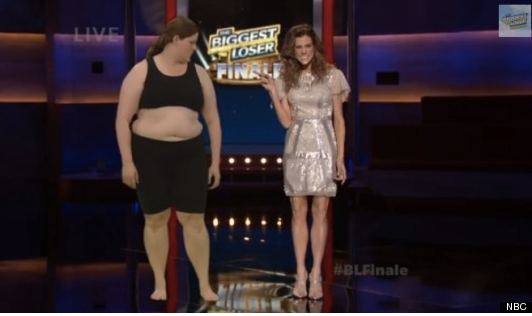 (As of today, Biggest Loser grand finale winner Rachel Frederickson is already “debuting a healthier look” than the one at left, as a form of ‘market correction’ from self-purported ‘over-enthusiasm’ in her endeavors…ahem.)
(As of today, Biggest Loser grand finale winner Rachel Frederickson is already “debuting a healthier look” than the one at left, as a form of ‘market correction’ from self-purported ‘over-enthusiasm’ in her endeavors…ahem.)
Lee Jordan: “The whole “Go Big or Go Home” common exhortation of the workout and coaching community on the surface sounds inspiring, but while we can spot the really nasty, negative and dangerous tactics that are out there around body shaming and pushing people into physically dangerous situations it’s the seemingly innocuous ones like this that bring the soul eroding…
Go Big or Go Home feeds on the black and white, “all or nothing” thinking (cognitive distortion) that is prevalent in many that struggle with eating disorders and/or obesity.
Unknowingly this type of coaching often leads to “failure” and a reduced self-image, thrusting the person back into their cycle of remorse and regret. We coach with more of a “Go SMALL or go home approach” emphasizing that “showing up” is winning and that small incremental increases, as used in our “30 Seconds To Victory” program will lead to a sustainable new free life. Through a series of “small wins” confidence and self-acceptance is nurtured as the person moves down the path to being healthy from the inside out.”
Shaping Youth: Is it the ‘reality TV’ competition set up of The Biggest Loser in itself that’s unhealthy with eating disorder cues, or the way they’ve pitted contestants against each other, etc. How would you discuss this with kids; specifically, how does this differ from say the Olympics in coaching form/function particularly in appearance-based body image sports like ice-skating, or ‘weigh in’ sports where eating disorders have been known to occur with greater frequency? How could coaches handle this differently?
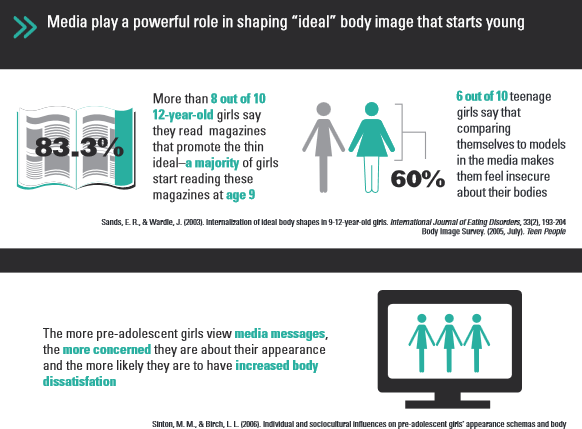 Lee Jordan: “I am not a fan of reality TV as much of it seems exploitive with yelling, screaming, aggressive behavior as form of entertainment; I find it mostly sad and disinteresting but I believe in choice and so wouldn’t ban it.
Lee Jordan: “I am not a fan of reality TV as much of it seems exploitive with yelling, screaming, aggressive behavior as form of entertainment; I find it mostly sad and disinteresting but I believe in choice and so wouldn’t ban it.
Regarding competitive environment, reality shows frequently group people together as a “family” then pit them against each other – this is vastly different than Olympians representing their countries in pre-determined SKILL based competitions.
While I am not a fan of Biggest Loser for the reasons I’ve mentioned, I do believe it could’ve been done in a way that would send a healthier message and still be a commercial success. The environmental cure method (putting everyone on a ranch on which the show is based) could be tossed and replaced with an experiential teaching style following a group of people over time, living in the “real world” of healthy eating, exercise, and problem solving practices. Not everyone in the process would ever be recognized as being part of the “show” in an effort to mitigate the false motivation of being on a “show” which is clearly not sustainable.”
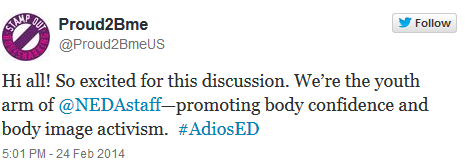 Dr. Kwame Brown: “The underlying message in our society: You are better and more valuable if I like the way you look. I like the idea of valuing each other for things way beyond looks, and letting the looks fall into place.
Dr. Kwame Brown: “The underlying message in our society: You are better and more valuable if I like the way you look. I like the idea of valuing each other for things way beyond looks, and letting the looks fall into place.
People are supposed to, are meant to, have the best body their genetics allows as a side effect of a life well lived, not as a goal in itself. I once asked my father as a teen “Am I good looking?” He responded, “Of course you are. Do you want to talk about something important, now?” I got immediately that he valued things FAR beyond looks.”
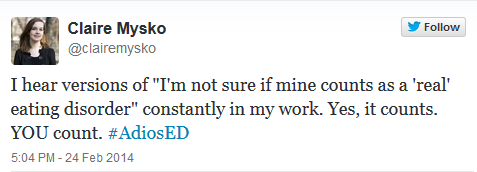 Marci Warhaft-Nadler: “As I mentioned in my 2014 Winter Olympics body image article on Shaping Youth (and 2012 Summer Olympics talking points to “get it right” to kids) certain competitive athletes are at higher risk for developing eating disorders than non-athletes.
Marci Warhaft-Nadler: “As I mentioned in my 2014 Winter Olympics body image article on Shaping Youth (and 2012 Summer Olympics talking points to “get it right” to kids) certain competitive athletes are at higher risk for developing eating disorders than non-athletes.
Sports like figure skating and gymnastics can put a lot of pressure on their athletes to keep their physiques as tiny as possible. And yes, proper coaching is key…Explain to kids that professional athletes (especially at competition time) need to live and eat differently than regular people. At times their diets and workout s need to change and intensify, but they are working with professional coaches and trainers who make sure that they stay healthy and don’t go too far.
There are cases when ambition gets ahead of safety which is how some athletes have ended up becoming or ill or developing eating disorders, which is why staying focused on keeping our bodies strong and fit and why surrounding ourselves with people we can trust is so important.
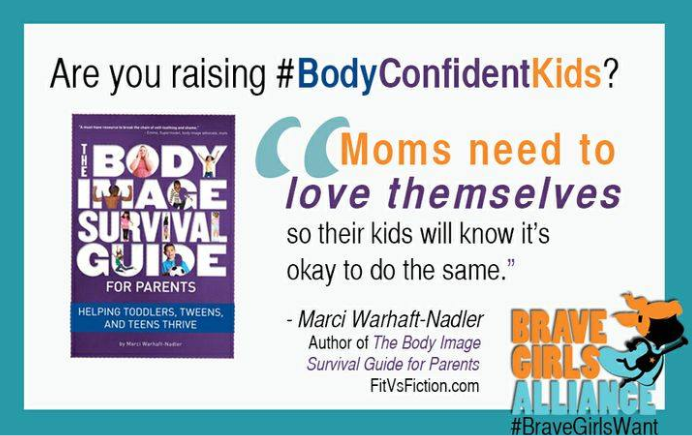 As an aside, I’ll also add a core message from our mutual Brave Girls Alliance partnership that gender stereotypes, the influence of appearance, and the handling of body image and athletes comes into play too…
As an aside, I’ll also add a core message from our mutual Brave Girls Alliance partnership that gender stereotypes, the influence of appearance, and the handling of body image and athletes comes into play too…
With all of the progress women have made in athletics, there is still a long way to go.
The fact that the USA Hockey team’s Lamoureux sisters for example, got criticized for “not smiling or looking happy enough” when they won their Silver medals is ridiculous. The training, discipline, focus and sacrifice it takes an athlete to make it to the Olympic games is intense and they go there with one thing on their minds, Gold. They played their hearts out and didn’t come out on top. To expect them to just smile and look pretty for the cameras in ridiculous…Were they supposed to hide their emotions because it wasn’t what other people wanted to see?
 I think that it’s still easier for some people to accept women participating in image based sports like figure skating, but have a harder time seeing them compete with strength and aggressiveness in a sport like hockey. But it’s not the athletes that need to evolve. The media needs to stop creating such a huge divide between male athletes and female athletes and start seeing them all as just ATHLETES.
I think that it’s still easier for some people to accept women participating in image based sports like figure skating, but have a harder time seeing them compete with strength and aggressiveness in a sport like hockey. But it’s not the athletes that need to evolve. The media needs to stop creating such a huge divide between male athletes and female athletes and start seeing them all as just ATHLETES.
In the case of 18-year old slalom medalist Mikaela Shiffrin (one article described her as “blond and bubbly-natured” another called her an ice Princess) I feel some reporters have become lazy and fall back on gender stereotyping adjectives to describe their male and female subjects, thus, Mikaela becomes a “princess” while skier Bode Miller is described as a “Wildman”…
This goes back to the need for media literacy and deconstructing messages when viewing with kids…so important, whether it’s The Biggest Loser or the Olympics!”
Shaping Youth: Thanks all, for the summations…
And while no one is implying there’s a causation link, the corollaries in media’s hyper-focused contests and competitions add CONTEXT to how pervasive body image and appearance cues have become in our mediated culture, as we see further knowledge to demystify and debunk the mythology surrounding eating disorders.
I really appreciate this week’s NEDA and Adios Barbie’s Twitter chat tagged #AdiosED (Storify recap here) packed with resources that helped me understand more about media and mythology too…That’s where I found this video and great quote about media, below.
This helpful infographic from the NEDA site and this quote from Melissa Fabello on the Miss Representation site states it well,
“The media does not cause eating disorders. Just like it doesn’t cause people to experience any other mental illness. Blaming the media for eating disorders is a dangerous trend because it helps create stigma around eating disorders, making it harder for people to get help: it turns them into conscious choices – an effort made by the individual to obtain an unrealistic beauty standard – rather than an effect of brain chemistry. The media doesn’t cause eating disorders any more than it causes people to commit murder. What it can do is trigger an already predisposed brain, but more often, what media images do is negatively affect body- and self-image, which in turn can lead to extreme dieting.”
More News You Can Use
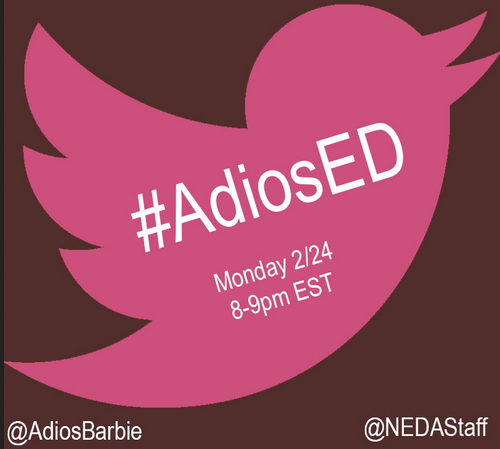 Again, I highly recommend scrolling through the AdiosED Twitter chat 2-24-14 recap hosted by Adios Barbie and NEDA, which is quite helpful in understanding behavioral health and applying tools and resources for better understanding, especially when it comes to adolescent behavioral health risks and media’s role.
Again, I highly recommend scrolling through the AdiosED Twitter chat 2-24-14 recap hosted by Adios Barbie and NEDA, which is quite helpful in understanding behavioral health and applying tools and resources for better understanding, especially when it comes to adolescent behavioral health risks and media’s role.
AND you might even try out the NEDA awareness quiz to see how much you do and don’t know already. (I did, it surprised me!)
On the government youth advocacy front, there’s also a six-part web series that just kicked off called “Girls Matter!” via SAMHSA (Substance Abuse and Mental Health Services Administration) billed as “challenges, opportunities, and strategies for supporting girls to increase the behavioral health workforce’s understanding of the needs and concerns of adolescent girls (primarily ages 12-18) and bring visibility and attention to the specific behavioral health concerns of adolescent girls.” You can follow them on social media at #GirlsMatter2014 Their next webinar is March 13, and here’s details on where their first session 2-25-14 is archived.
 On a lighter, parenting and picture books note, there’s a bounty of pertinent young adult (YA) and “kid lit” about body image and weight grouped by age and stage to uncork conversations on Toward the Stars a partner org with the Brave Girls Alliance, where you’ll see Marci’s book in the mix too.
On a lighter, parenting and picture books note, there’s a bounty of pertinent young adult (YA) and “kid lit” about body image and weight grouped by age and stage to uncork conversations on Toward the Stars a partner org with the Brave Girls Alliance, where you’ll see Marci’s book in the mix too.
Also, check out this very helpful and specific to the topic resource laden post on A Mighty Girl “Talking About Eating Disorders” with a spotlight on pragmatic picks and book tips, particularly for preteens and teens.
As you consume the offerings in NEDA Awareness week 2014, I’ll hope you keep in mind that the “biggest winners” are those who use the opportunity to engage with this information-laden week of education to gain a greater understanding of the many facets and nuanced types of eating disorders.
As their NEDA motto and poster targeting teens aptly reminds, “Everyone knows someone…”









Wow! This is an amazing compilation of stats, articles, opinion. I teach Adolescent Psychology every semester and cover eating disorders to a population of young college women who are vulnerable to all the negative messages. Thanks for sharing.
-Sara
http://www.parenting-teens.org
http://helpimparentingteens.wordpress.com/
Thanks, Sara… You might want to peruse the whole ‘body image’ category of this site, as the archives have got TONS of data that span over the last 7 years with tons of research, articles and data points. A quick glimpse will give you a feel for just how pervasive the issue has become…Appreciate all that educators do to counteract some of the toxic cues coming at kids. Admire your work in adolescent psychology for certain, so ‘wow’ back atcha! 😉
Great post. It’s no surprise that many Biggest Loser contestants gain back the weight — the show is a totally artificial, contrived environment that has little to do with maintaining a healthy weight in real life. The media is definitely complicit in sending the wrong message, as was clear with recent reporting on a study of BL Season 8 contestants, which basically proclaimed that trying to lose weight is futile, based on this very narrow, unrepresentative sample.
Agree wholeheartedly on the contrived, manufactured health problems they’re seeding and supporting…sigh.